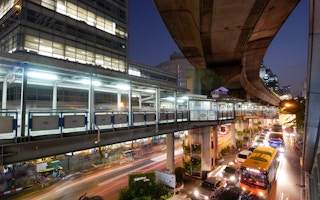When global leaders adopted the United Nations’ Sustainable Development Goals (SDGs) last September, the move sparked optimism among development practitioners, civil society and communities alike. The 17 goals promised hope that by 2030, hunger and poverty would be eradicated, dangerous climate change averted and everyone would have access to clean energy.
The goals, which came into effect at the beginning of this year, are widely regarded as more expansive and holistic than their predecessors, the Millennium Development Goals (MDGs). While the latter focused mainly on developing countries, the SDGs are applicable to all countries and address issues beyond poverty alleviation, such as sustainable industrialisation, responsible consumption and production and healthy cities.
But achieving such an ambitious set of targets at a global scale will only be possible with an unprecedented level of international collaboration and cooperation, say experts.
As Niall O’Connor, Asia Centre Director at global sustainability think-tank Stockholm Environment Institute, puts it: “While certain immediate needs, such as food security, gender equity or climate mitigation differ enormously between regions, we all, collectively, have to be part of the same solutions.”
O’Connor and other global SDG experts will be speaking on how these groups, as well as policymakers from Asia and Europe, can achieve the leaps in national planning and implementation needed to achieve the SDGs at the upcoming ‘Sustainable Development Goals for Asia and Europe: Delivery Options for Agenda 2030‘ conference in Stockholm, Sweden.
Organised by the Asia-Europe Environment Forum—an initiative which aims to deepen cooperation on sustainable development between the two regions—in partnership with the Asia-Europe Foundation (ASEF), Government of Sweden and SEI among others, the two-day conference will gather some 100 participants and speakers including government officials responsible for SDG implementation, civil society experts and academics.
The event will be held at the city’s Brewery Conference Centre, and will feature a combination high-level plenaries on the policy shifts, financing and collaborations needed to achieve the SDGs globally, as well as sessions where representatives from Asian and European nations will share their own lessons from translating the global goals into national plans.
Ambassador Zhang Yan, executive director, Asia-Europe Foundation, notes that “the conference provides a participatory platform for representatives from Asia-Europe Meeting Partners to share their experiences in implementing the SDGs”.
“
The SDGs are nothing short of a historic opportunity—and indeed, responsibility to steer society and the global environment away from its current dangerous development path.
Laszlo Pinter, senior fellow and associate, International Institute for Sustainable Development
Given that it has been only 10 months since the SDGs—which are part of a broader 15-year long development agenda—it remains to be seen whether the global effort to achieve the SDGs will be a success.
But as things stand, some experts take a pessimistic view.
For example, a recent report titled ‘The Future of Spaceship Earth‘ by Norwegian energy and advisory services giant DNV GL, for example, makes the bleak prediction that “none of the Sustainable Development SDGs will be met in all regions of the world”.
In fact, not even half of the goals will be achieved in any of the five regions identified by DNV GL. These are: the United States, member countries of the Organization for Economic Co-Operation and Development (OECD) except the US, China; a group dubbed ‘BRISE’, which consists of 14 major emerging economies including India, Russia, and Brazil; and the rest of the world.
Perhaps the most noticeable difference in how regions are expected to fare is between OECD countries—most Western European countries, along with Australia and New Zealand—and the BRISE nations, which include Asian economies such as India, Indonesia, Thailand and Vietnam.
DNV GL’s analysis—derived through the use of various forecasting models—shows that while Europe and its OECD counterparts are set to meet six out of the 17 goals including achieving sustainable cities and communities; promoting sustainable industries, innovation and infrastructure; and delivering clean water and sanitation, BRISE countries are not on target to fulfil any of the goals completely.
This inequality threatens to undermine the success of the goals, which remain an ultimately global agenda; the shared targets cannot be considered as fulfilled if success is not universal.
It is perhaps in recognition of this that the United Nations has chosen “global partnerships” as its last goal, calling on governments, companies and civil society groups to work together to implement and deliver the SDGs.
This is precisely what the conference hopes to achieve by bringing Asian and European representatives responsible for the SDGs in their own countries, say organisers.
O’Connor adds that a series of roundtable events at the conference will also discuss the roles that different groups play in ensuring the targets are met, and will also offer ideas and opportunities for new collaborations.
“Evidence-based science can influence policy and support stronger governance, youth and civil societies can and do wield enormous power to make choices and to affect positive and sustainable changes and the private sector can and should be integrated as a critical player in bringing about a better life for all,” he shares.
Laszlo Pinter, senior fellow and associate, International Institute for Sustainable Development—one of the experts presenting at the event—notes: “The SDGs are nothing short of a historic opportunity—and indeed, responsibility to steer society and the global environment away from its current dangerous development path.”
“The moment to start that process in earnest is now,” he adds.
Eco-Business is a media partner for the Sustainable Development Goals for Asia and Europe: Delivery Options for Agenda 2030 will be held in Stockholm from 19 to 20 October and is an invite only event. Click here to register your interest.

















